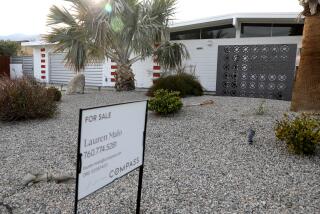A Zillow for the uber-rich? Luxury real estate veteran Jeff Hyland thinks he can sell it
Jeff Hyland has handled some of Southern Californiaâs most notable real estate deals in recent memory, including the $150-million sale of Jerry Perenchioâs famed âThe Beverly Hillbilliesâ estate and LeBron Jamesâ recent $36.75-million purchase in Beverly Hills.
The co-founder of the Hilton & Hyland brokerage also holds the priciest listing in the U.S. â a Bel-Air trophy mansion owned by financier Gary Winnick thatâs up for grabs at $225 million.
Apparently, at 73, thatâs not enough.
The veteran broker has teamed up with Bonnie Stone Sellers, a former chief executive of Christieâs International Real Estate, to start Forbes Global Properties, a joint venture with the media company synonymous with wealth.
The Beverly Hills-based internet platform is a sort of Zillow for the uber-rich, highlighting a curated selection of luxury homes on sale around the world listed by its affiliated independent brokerages for at least $2 million to well over $100 million.
Hyland sat down with The Times to discuss disruption in the real estate industry, the unrelenting growth of luxury home sales and the logic of launching amid the worst pandemic in a century. This interview has been edited and condensed for clarity and space.
How did this partnership come about? Did Forbes come to you or did you go to them?
I went to them. Iâd thought of going to Architectural Digest, but then when we did some checks, we found out that the average eyeballs on Architectural Digest were contractors, decorators and housewives with nothing to do. The beauty of Forbes is that itâs the most well-acknowledged global platform out there in terms of high-net-worth individuals. Weâre creating the Zillow of high-net-worth individuals for real estate.
What service does Forbes Global Properties provide, and how it is different from other real estate websites?
Weâre appealing to the luxury high-end customer. There are 140 million unique visitors on a monthly basis to the Forbes platform, and our affiliates on the platform will only present the best listings. Itâs $2 million and up. Buyers will come onto the site, they will connect immediately with the agent who has the listing on the platform, and then thereâll be a one-on-one conversation between the two. It doesnât go through a third party, and thereâs nobody taking money off the top.
How are you making money then?
Every member pays a membership fee on an annual basis. We do not take any fee as a pass-through. At some point, our profit model is going to be in the specialized ads, like Aston Martin could become an exclusive member â Loro Piana, Rolls-Royce, Richard Mille watches â because they realize that the people coming to the website are among the most important, influential, wealthy people around the world.
This new platform has its own media operation. How integral is that to what you are doing?
Hyland & Hilton does over $3 billion a year out of one office. One of the reasons weâve gotten there is through the photography, through the video presentations. The whole future is no longer print, itâs all digital. And that was one of the reasons that Forbes was the only place to go. Because they already had that global presence.
What about social and other media? New York luxury real estate agent Ryan Serhant starred in a reality show and has a million subscribers on YouTube.
Yeah, we absolutely will do social media. There are a lot of brokers who are on these reality TV shows, but what is not disclosed to the average viewer is whoâs looking at that website. Theyâre probably a $60,000-a-year person in a flyover state, who has nothing to do but just look online all day. They donât want to tell you that. But I know that because Iâve had several of those brokers work in my office whoâve done the show. So we all know it.
Jeffrey Katzenbergâs entertainment streaming platform Quibi launched during the pandemic and then shut down, losing well over $1 billion for its backers. Yet here you are opening up amid the worst days of it.
A client was telling me a few weeks ago he had hired some geek from MIT who asked him, âDo you know what caused the Roaring â20s? The Spanish flu. It put everybody in the U.S. in such a funk that when they got out of the flu, they were spending like there was no end in sight.â When we get out of COVID-19, and when Trumpâs gone and we can all move forward, I think weâre going to see an absolutely fantastic 2021, 2022, 2023 and 2024, especially for the high-net-worth individual.
After âa gloomy COVID winter,â widespread vaccination will bring years of robust growth to Californiaâs economy, the UCLA Anderson forecast says.
But we all remember what happened after the Roaring â20s.
The best thing that happened in the 1930s was that we learned the message of what happened in the â20s. So we got the Federal Reserve, and we had all these other things that we brought in to prevent it from happening again.
Still, with all this growing inequality, which has worsened during the pandemic, it feels a bit odd to be talking about a new luxury real estate platform.
One hundred years ago, the top 200 people had 60% of the wealth in the U.S. And now itâs like three times that number. It is unfortunate that we are really having a class struggle, and itâs not just the U.S., itâs around the world. But we can only deal with what we can deal with. Itâs unfortunate that all that money was given away by Trump to the rich, and now Bidenâs going to have to continue to keep everybody afloat. But the U.S. is still the greatest place to be and the freest place in the world. So even if there are issues down the road, I think the rich will get richer on a global basis, and they will look to the U.S. as a place to park their money.
You have founding member brokerages in about 75 locations internationally. How many partners are you ultimately trying to bring in?
Our expectation is to have no more than 100 independent offices around the globe. Iâm a real rooter for independence, and thatâs what we see here. Weâll vet every member before theyâre allowed in to keep everything on a very exclusive, high-brand level.
Whatâs the balance of U.S. listings on the site compared with international listings?
Right now we have about 50/50, and I would like to change it so it becomes 75% U.S. and 25% foreign. But we do know that the international market is expanding really fast. The advantage we have is that Forbes is very well stationed in Southeast Asia, which to me is the great emerging market.
How many employees are working specifically for Forbes Global Properties?
Right now we have about seven or eight, and come January, weâll probably have 12. The idea is to keep it lean and mean. Thereâs no need to have 30 people running it.
As the founder, whatâs your role?
Bonnie Stone Sellers and I will both be cheerleaders. Weâll both be the face and both be promoting it. Iâll shepherd this; itâs been a lifelong dream. In all the things that Iâve done, this is probably the culmination of 40 years of single-family luxury real estate.
Which markets do you think will continue to thrive in the years to come?
Weâre one of three great markets that will continue to do well. The Hamptons obviously because of people getting out of Manhattan. Palm Beach, Fla., for taxes. And California because of the weather, and because itâs still a place where people want to have a presence. Everyone still wants to be here. They want to have a backyard, especially during COVID. They want to have walking streets.
Pandemic or not, the ultra-wealthy are still buying and selling prized properties across L.A. County
Elon Musk has just left for Texas with its lower taxes, but youâre still big on California.
Today, these $100-million properties will all be second, third or fourth homes for people. So even though California has this horrendous tax rate, it wonât affect homeowners, because they wonât claim this as their home operation. So the L.A. market is blessed and will continue to expand.
Final question. Why are you even doing this, given how successful you are?
I could certainly have retired 10 years ago and had a great time, but I have a passion for the business. I love what Iâm doing. I was born and raised here, and I have an architectural passion. I wanted to be an architect, but I couldnât do the math, so this was the next best way to get into it.
More to Read
Inside the business of entertainment
The Wide Shot brings you news, analysis and insights on everything from streaming wars to production â and what it all means for the future.
You may occasionally receive promotional content from the Los Angeles Times.













